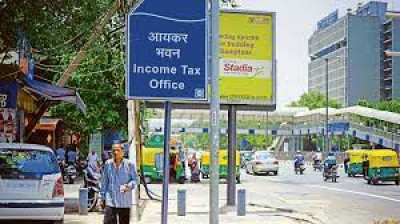Share and mutual fund income taxation in case income accrue and arise in Hong Kong and Person are dual residency status - India VS Hongkong DTAA Taxation clarification
Fact of the case :
- The person is an Indian National who is currently ROR status & presently resides full time in India.
- Person is also currently holding ROA (Right of Abode) status in Hong Kong (HKSAR), although not presently residing there.
- They invested in Mutual Funds in Hong Kong in 20X1, the dividends paid on these are considered not 'tax assessable' in Hong Kong & do not need to be declared there according to Hong Kong tax laws, thus no taxes need to be paid on them there in HKSAR.
- All of the monies invested in the Mutual Funds were from earnings made in Hong Kong when the person was a full time resident of HKSAR & holding Hong Kong ROA (Right of Abode) status & also NOR/NRI in India at the same time.
- All taxes were therefore paid in Hong Kong in full up until the point when the money was invested in the Mutual Funds in August of 20X1.
- In case the entire sum invested originated only in Hong Kong & no money has been transferred from India to Hong Kong nor from Hong Kong to India.
- the DTAA has come into effect in India from the 1st April 20X1.
Tax implications on these dividends in India under the above circumstances of the individual concerned as per the proviso of the DTAA
Reply/ Responses : We have understand your concern with regard to Tax implication on income associated with Income from Mutual Funds. As per your below query, please find our point wise reply. This is in respect of DTAA between India and Hong Kong, there are various article, which covers the source of Income, which a person who is taxable in both the countries, shall be subject to the DTAA Provisions.
Now as you mentioned for Article 24 of the DTAA Agreement between India and Hong Kong, which states –
Article 24 Non-Discrimination
1. Persons who, in the case of the Hong Kong Special Administrative Region, have the right of abode or are incorporated or otherwise constituted therein, and, in the case of India, are nationals, shall not be subjected in the other Contracting Party to any taxation or any requirement connected therewith, which is other or more burdensome than the taxation and connected requirements to which persons who have the right of abode or are incorporated or otherwise constituted in that other Party (where that other Party is the Hong Kong Special Administrative Region) or nationals of that other Party (where that other Party is India) in the same circumstances, in particular with respect to residence, are or may be subjected. This provision shall, notwithstanding the provisions of Article 1, also apply to persons who are not residents of one or both of the Contracting Parties.
2. The taxation on a permanent establishment which an enterprise of a Contracting Party has in the other Contracting Party shall not be less favourably levied in that other Party than the taxation levied on enterprises of that other Party carrying on the same activities. This provision shall not be construed as obliging a Contracting Party to grant to residents of the other Contracting Party any personal allowances, reliefs and reductions for taxation purposes on account of civil status or 29 family responsibilities which it grants to its own residents. This provision shall not be construed as preventing a Contracting Party from charging the profits of a permanent establishment which a company of the other Contracting Party has in the first mentioned Party at a rate of tax which is higher than that imposed on the profits of a similar company of the first mentioned Contracting Party, nor as being in conflict with the provisions of paragraph 3 of Article 7.
3. Except where the provisions of paragraph 1 of Article 9, paragraph 7 of Article 11, paragraph 6 of Article 12, or paragraph 3 of Article 13, apply, interest, royalties, fees for technical services and other disbursements paid by an enterprise of a Contracting Party to a resident of the other Contracting Party shall, for the purpose of determining the taxable profits of such enterprise, be deductible under the same conditions as if they had been paid to a resident of the first-mentioned Party.
4. Enterprises of a Contracting Party, the capital of which is wholly or partly owned or controlled, directly or indirectly, by one or more residents of the other Contracting Party, shall not be subjected in the first-mentioned Party to any taxation or any requirement connected therewith which is other or more burdensome than the taxation and connected requirements to which other similar enterprises of the first-mentioned Party are or may be subjected.
Now, in your concern, it has been clarified that you are resident in India, and a Right of Abode holder in Hong Kong. Thus, on that basis, the Principle of Tie Breaker Test for Dual Residency is required to be clarified. So for this, we have asked you clarification on the following factors –
- Permanent Home Available
- Centre of Vital Interest
- Habitual Abode
- Right of Abode/nationality.
it was clarified that majority of the factors relates to India, and hence, in accordance with the DTAA Dual Residency provisions, you shall be considered as an Indian Resident.
Now, since you would be considered as an Indian Resident for relief under DTAA Provisions, we now look into the different aspects related to taxation of income associated with Mutual Funds held by you in Hong Kong. As per your case, there are two different aspects associated with your transaction in Hong Kong.
-
Dividend from Mutual Fund
Now, where you are having dividend income in respect of mutual funds held in Hong Kong, then the same will covered under Article 10 of the DTAA Agreement, which states the following –
1. Dividends paid by a company which is a resident of a Contracting Party to a resident of the other Contracting Party may be taxed in that other Party.
2. However, such dividends may also be taxed in the Contracting Party of which the company paying the dividends is a resident and according to the laws of that Party, but if the beneficial owner of the dividends is a resident of the other Contracting Party, the tax so charged shall not exceed 5 per cent of the gross amount of the dividends. This paragraph shall not affect the taxation of the company in respect of the profits out of which the dividends are paid.
3. The term “dividends” as used in this Article means income from shares, or other rights, not being debt-claims, participating in profits, as well as income from other corporate rights which is subjected to the same taxation treatment as income from shares by the laws of the Party of which the company making the distribution is a resident.
4. The provisions of paragraphs 1 and 2 shall not apply if the beneficial owner of the dividends, being a resident of a Contracting Party, carries on business in the other Contracting Party of which the company paying the dividends is a resident, through a permanent establishment situated therein, or performs in that Party independent personal services from a fixed base situated therein, and the holding in respect of which the dividends are paid is effectively connected with such permanent establishment or fixed base. In such case the provisions of Article 7 or Article 15, as the case may be, shall apply.
5. Where a company which is a resident of a Contracting Party derives profits or income from the other Contracting Party, that other Party may not impose any tax on the dividends paid by the company, except insofar as such dividends are paid to a resident of that other Party or insofar as 16 the holding in respect of which the dividends are paid is effectively connected with a permanent establishment or a fixed base situated in that other Party, nor subject the company’s undistributed profits to a tax on the company’s undistributed profits, even if the dividends paid or the undistributed profits consist wholly or partly of profits or income arising in such other Party.
6. The benefits of this Article shall not be available if the main purpose or one of the main purposes of any person concerned with the creation or assignment of the shares or other rights in respect of which the dividends are paid is to take advantage of this Article by means of that creation or assignment.
Hence the same would be taxed in Hong Kong. Now, it is known that there is no taxation on Dividend Income from Mutual Fund in Hong Kong. Thus, the said amount of dividend income would be taxed in India at the slab rate applicable on you (Resident of India).
-
Capital Gain from Mutual Fund
Now, where you are having Mutual Fund Capital Gain Income in Hong Kong, the same be considered as Capital Gain as per Article 14 of the DTAA Agreement, which states as follows –
Capital Gains
1. Gains derived by a resident of a Contracting Party from the alienation of immovable property referred to in Article 6 and situated in the other Contracting Party may be taxed in that other Party.
2. Gains from the alienation of movable property forming part of the business property of a permanent establishment which an enterprise of a Contracting Party has in the other Contracting Party or of movable property pertaining to a fixed base available to a resident of a Contracting Party in the other Contracting Party for the purpose of performing independent personal services, including such gains from the alienation of such a permanent establishment (alone or with the whole enterprise) or of such fixed base, may be taxed in that other Party.
3. Gains from the alienation of ships or aircraft operated in international traffic, or movable property pertaining to the operation of such ships or aircraft shall be taxable only in the Contracting Party of which the alienator is a resident.
4. Gains derived by a resident of a Contracting Party from the alienation of shares of a company deriving more than 50 per cent of its asset value directly or indirectly from immovable property situated in the other Contracting Party may be taxed in that other Party. 22
5. Gains from the alienation of shares other than those mentioned in paragraph 4 in a company which is a resident of a Contracting Party may be taxed in that Party.
6. Gains from the alienation of any property, other than that referred to in paragraphs 1, 2, 3, 4 and 5, may be taxed in each Contracting Party in accordance with the provisions of its domestic law.
7. The benefits of this Article shall not be available if the main purpose or one of the main purposes of any person concerned with the alienation of property in respect of which the capital gains are derived is to take advantage of this Article by means of that alienation.
Thus, you would be required to pay applicable capital gain tax in Hong Kong in respect of capital gain arising from sale of mutual fund. Now, again the capital gain on mutual fund is not taxable in Hong Kong. Hence, the same would be required to be taxed in India as capital gain and the same be taxed @ 15% for Short term gain, and 10% on Long term capital gain (without indexation and for Listed one), or 20% on Long term capital gain (with indexation).
Relief in India
Now, in order to provide for relief against double taxation, the DTAA provides for Article 23, which states as follows –
Methods for Elimination of Double Taxation
Double taxation shall be eliminated as follows:
1. in the Hong Kong Special Administrative Region:
Subject to the provisions of the laws of the Hong Kong Special Administrative Region relating to the allowance of a credit against Hong Kong Special Administrative Region tax of tax paid in a jurisdiction outside the Hong Kong Special Administrative Region (which shall not affect the general principle of this Article), Indian tax paid under the laws of India and in accordance with the Agreement, whether directly or by deduction, in respect of income derived by a person who is a resident of the Hong Kong Special Administrative Region from sources in India, shall be allowed as a credit against Hong Kong Special Administrative Region tax payable in respect of that income, provided that the credit so allowed does not exceed the amount of Hong Kong Special Administrative Region tax computed in respect of that income in accordance with the tax laws of the Hong Kong Special Administrative Region.
2. in India:
(a) Where a resident of India derives income which, in accordance with the provisions of this Agreement, may be taxed in the Hong Kong Special Administrative Region, India shall allow as a deduction from the tax on the income of that resident, an amount equal to the tax paid in the Hong Kong Special Administrative Region. 28 Such deduction shall not, however, exceed that portion of the tax as computed before the deduction is given, which is attributable, as the case may be, to the income which may be taxed in the Hong Kong Special Administrative Region.
(b) Where in accordance with any provision of the Agreement income derived by a resident of India is exempt from tax in India, India may nevertheless, in calculating the amount of tax on the remaining income of such resident, take into account the exempted income
Now. It has been clarified in the above point wise reply that you are not liable for making any tax payment in Hong Kong, and thus, the applicability of Article 23 and the Foreign Tax Credit would not be available to you and hence, you would be required to make the payment of applicable tax in India itself.






